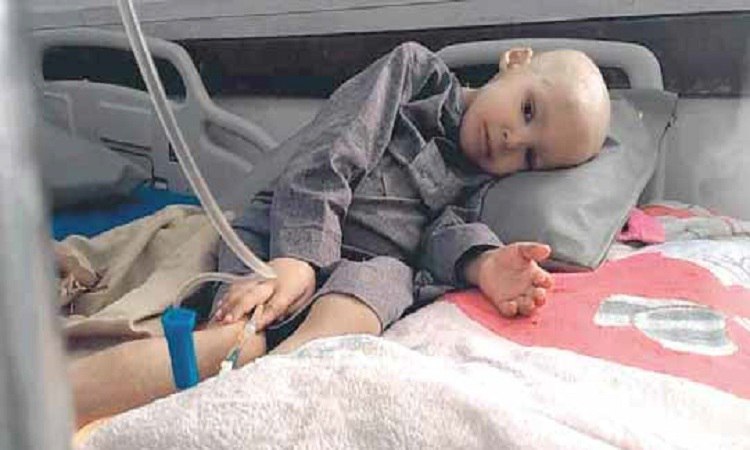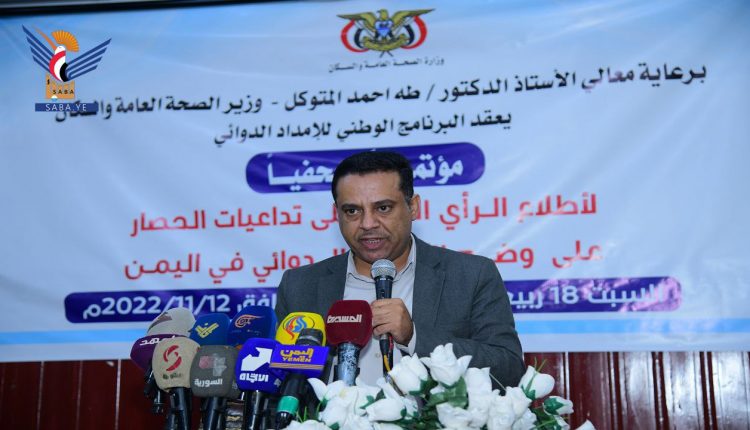Yesterday, Saturday, the Drug Supply Program confirmed that the continuation of the US-Saudi aggression and siege threatens to stop the work of the program and its supply for more than 170,000 vulnerable patients.
During a press conference held yesterday in the capital, Sana’a, to shed light on the effects of the blockade on the life-saving drug sector, the Director General of the National Drug Supply Program, Dr. Samir Al-Sanafi, reviewed the program’s efforts in providing patients’ needs for subsidized drugs according to the National List of Essential Medicines. The program worked on the procurement of medicines, in addition to receiving and dispensing health aid, especially insulin for diabetics, kidney transplant medicines, immune diseases, hemophilia, hypertension, heart, epilepsy, liver, tablet sclerosis, and dwarfism-related drugs. He explained that the total patients directly benefiting from the program are 169,627 civilian.
Al-Sanafi said: We are experiencing difficulty in providing life-saving, vital and refrigerated medicines, and the high cost of their access as a result of the complexities of the blockade and the closure of sea and airports.
He pointed out that the UN aid mechanism, when it comes to medicine, is ineffective compared to huge demand and the human tragedy created by the blockade. In addition, he noted that there is a rise in diabetes, stunting, cancerous tumors, liver and hemophilia chronic diseases during the 8 years of the siege.
He pointed out that the stop of the salaries and state revenues by the coalition of aggression represented the biggest difficulties the program is facing today. Also, there has been a shortage of the program's cadres and ability to work, pointing out that as a result of the blockade and the closure of Sana'a Airport, international companies refrained from providing their medicines in Yemen.

Al-Sanafi stressed that the aggression and siege caused a health disaster and difficulties whose consequences affected the performance of health institutions, including the drug supply program. The most hindering obstacle is the difficulty of providing vital medicines as a result of companies’ apology and stopping supplying them and the difficulty of importing them, despite addressing representatives and creating official tenders. The reason is because of the closure of vital outlets, foremost of which is the Sana'a airport, and Hodeidah Port, which caused interruptions of some vital medicines for several periods.
He pointed out that the detention of aid and containers at the air, sea and land ports in the areas controlled by the aggression and its mercenaries caused the medicines to reach their expiration date, despite the fact they are poorly storage and their costs increases.
He touched on the difficulties that the program faced, such as the Corona pandemic and the spread of epidemics such as diphtheria cholera, rabies, and others.
Meanwhile, Deputy Director General of the Drug Supply Program, Dr. Abdulqawi Al-Junaid, explained to the Al-Masirah Arabic newspaper that the program is experiencing great difficulty in providing medicines with the continued siege and closure of the airport.
He pointed out that the program suffers from a significant shortage of medicines for chronic diseases and medicines for kidney failure.
In addition, the Ministry of Public Health and Population confirmed in a statement during the conference that the continuation of the aggression and siege threatens to stop the health system in Yemen, including the national drug supply program.
In its statement, the Ministry called on the United Nations to do its humanitarian responsibilities, solve the problems related to the health sector in general and the medicine sector in particular, and to rescue patients immediately by facilitating the entry of medicines in order to distribute them in the required manner, especially life-saving medicines.
It also demanded the lifting of the siege and the opening of air, sea and land ports, foremost of which is Sana'a Airport, for all commercial and international flights and humanitarian aid, on an ongoing basis, especially in front of pharmaceutical shipments and medical supplies, and to facilitate their entry.
The statement, which was read by the official spokesman for the ministry, Dr. Anis Al-Asbahi, called on the United Nations to allow the entry of medical aid without conditions, detention, or delay, as it is a purely humanitarian cause. He called on organizations working in the health field to pay attention to providing life-saving medicines and facilitating their entry, including kidney transplant medicines and medicines related to Immunology.
He pointed out that the program seeks, with its modest capabilities, to meet the severe need for important and life-saving medicines on a continuous, effective and fair basis, and distribute them to those who deserve them, through the available and possible means, whether governmental, private sector or organizations.
The statement touched on the program's efforts during the past few years in providing quality medicines for the first time, in addition to its work and its usual activity as a humanitarian initiative to save the lives of many patients, especially during the period of the aggression the country is facing. Moreover, the statement explained that the increasing number of people with rare and immunological diseases at the present time will contribute to the failure of the services the program is offering in the future, as a result of the continuation of the blockade.








